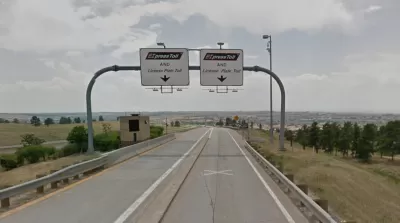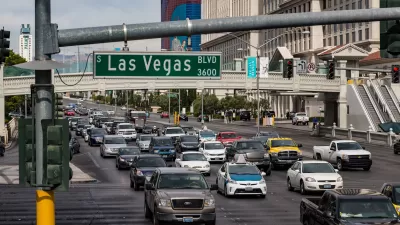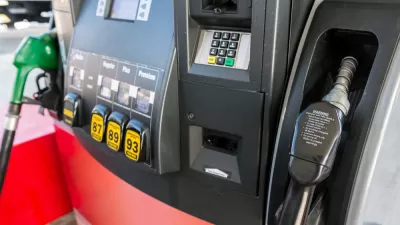Colorado residents are now being recruited to participate in a four-month program to evaluate how motorists react to being charged by the mile driven rather than gallon of fuel burned. Sagging fuel tax revenues are the impetus for the pilot program.

The Colorado pilot program, operated by the Colorado Department of Transportation (CDOT), stands out among other mileage fee programs in its size and duration—only 100 volunteers will participate for four months, so if you are a resident and interested in participating, act now.
By contrast, the two other programs in operation—the nine-month pilot in California and the ongoing Oregon program known as OReGO both call for 5,000 volunteers, and the yet-to-commence Hawaii program calls for over a million participants.
"CDOT says it will offer three basic ways for drivers in the pilot program to track mileage: reporting and recording what the odometer shows or plugging a device into their car that tracks mileage — with GPS capability or without," reports John Aguilar for The Denver Post:
Participants will receive a 'mock' bill from the Colorado Department of Transportation for 1.2 cents per mile driven, just like Caltrans charges participants in their program, though their fee is 1.8 cents. In Oregon, it's 1.5 cents, but it's not a mock bill—money changes hands.
However, all three programs credit drivers with the gas tax they paid, which creates a serious problem: drivers of fuel-efficient vehicles are essentially penalized, as motorist Mike King of Arvada told Aguilar.
He also finds it a tough sell that drivers of more fuel-efficient vehicles — King owns a Prius — would essentially be penalized by the per-mile model because his charges under that system would exceed what he pays now in taxes at the pump.
“You want to do the right thing,” he said. “But I want to continue paying at the pump.”
An alternative approach would be to keep the current 22-cent gas tax [PDF], unchanged since 1993 and add the road usage charge [also called a Mileage User Fee (MBUF) or Vehicle Miles Traveled (VMT) Fee], thus all drivers pay a road fee and pay gas taxes in proportion to the fuel they burn. Another alternative would be to change the road usage charge to a variable, as opposed to flat rate, "accounting for environmental benefits."
Surprisingly, the Colorado program was not one of the eight projects to be awarded a federal FAST Act grant on August 30 to demonstrate alternative, user-based revenue programs, although it is a member of the Western Road Usage Charge Consortium [PDF] which received funding via the Oregon Department of Transportation. The Colorado pilot is using federal funding from MAP 21, according to CDOT spokeswoman Megan Castle.
Colorado's infrastructure-funding crisis
"Colorado’s share of fuel tax revenues has stagnated over the past decade," adds Aguilar. The tax generated more revenue almost ten years ago than it does today.
CDOT spokeswoman Amy Ford pointed to more fuel efficient vehicles, including hybrids and electric vehicles, as the chief cause, but Carl Davis, research director at the Washington, D.C.-based Institute on Taxation and Economic Policy, offered a different reason.
“Inflation has been more important than hybrid technology in explaining why tax gas revenues are falling short,” Davis said.
The real solution, at least in the short term, is to index the gas tax to inflation, as has been done in six states. Georgia last year did something even better, he said. Lawmakers there passed legislation that links the gas tax rate to inflation in highway construction costs and to shifting fuel efficiency standards.
Among all states and the District of Columbia, Colorado has the 38th highest state gas tax [PDF]. It's gas tax is more than eight cents lower than the national average of 30.46 cents as of November 1, 2016 per API.
Also in the media:
- CBS Denver: Drivers Could Be Charged Per Mile To Pay For Roads, November 11, 2016
- CDOT press release: CDOT Announces Road Usage Charge Pilot Research Program, November 2016
- The Denver Post Editorial: Capitalize on low fuel prices by raising Colorado gas tax, April 26, 2016
- 99.5 The Point: Colorado Looking at Increasing State Gas-Tax, March 10, 2015
Related in Planetizen:
- Hawaii to Embark on Nation's Largest Mileage Fee Demonstration Program, September 30, 2016
- Over $14 Million Awarded to Eight Projects to Find Alternatives to Gas Taxes, September 6, 2016
- California's Road Usage Charge Pilot Program to Begin on July 1, January 30, 2016
- Inflation, not Fuel Efficiency, Is Main Flaw of Gas Tax, June 25, 2015
Hat tip to Governing.
FULL STORY: CDOT to test taxing drivers by the mile instead of at the pump

Maui's Vacation Rental Debate Turns Ugly
Verbal attacks, misinformation campaigns and fistfights plague a high-stakes debate to convert thousands of vacation rentals into long-term housing.

Planetizen Federal Action Tracker
A weekly monitor of how Trump’s orders and actions are impacting planners and planning in America.

In Urban Planning, AI Prompting Could be the New Design Thinking
Creativity has long been key to great urban design. What if we see AI as our new creative partner?

King County Supportive Housing Program Offers Hope for Unhoused Residents
The county is taking a ‘Housing First’ approach that prioritizes getting people into housing, then offering wraparound supportive services.

Researchers Use AI to Get Clearer Picture of US Housing
Analysts are using artificial intelligence to supercharge their research by allowing them to comb through data faster. Though these AI tools can be error prone, they save time and housing researchers are optimistic about the future.

Making Shared Micromobility More Inclusive
Cities and shared mobility system operators can do more to include people with disabilities in planning and operations, per a new report.
Urban Design for Planners 1: Software Tools
This six-course series explores essential urban design concepts using open source software and equips planners with the tools they need to participate fully in the urban design process.
Planning for Universal Design
Learn the tools for implementing Universal Design in planning regulations.
planning NEXT
Appalachian Highlands Housing Partners
Mpact (founded as Rail~Volution)
City of Camden Redevelopment Agency
City of Astoria
City of Portland
City of Laramie





























